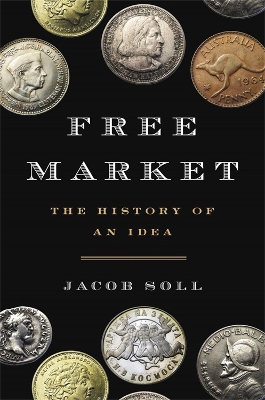
After two government bailouts of the American economy in less than twenty years, free market thought is due for serious reappraisal. Free Market: The History of an Idea shows how the idea became so powerful, why it succeeded, and why it has failed so spectacularly. In 1990, the G7 Countries enjoyed 70 percent of world GDP. In the face of the collapse of the Soviet Union, it was supposed to be a story of the success of free markets. However, in the past thirty years, that number has dropped by half, and Asia has emerged as a major motor of world economic growth. Today, state-run China is the second biggest economy on earth, and tiny Singapore, with its state-owned companies, has become a new model of wealth creation. In other words, Milton Friedman's free market dogma, that only private companies can create wealth and that states hamper it, has not proved very clearly to be untrue. This book shows how we got to the current crisis of free market thought, and suggests how we can find our way out. Contrary to popular free market narratives, early market theorists believed that states had an important role in building and maintaining free markets. But in the eighteenth century, some free-market thinkers began insisting only pure free markets, without state intervention, could work. A tradition of free-market ideological brittleness emerged, and it has led orthodox free market economics to some spectacular failures. It is a paradox that an economic theory rooted in the idea of competition, adaptation and evolution, has refused to follow its own precepts. This book shows that we need to go back to the origins of free market thought in order to understand its dynamism, as well as its inherent weaknesses, and to develop new economic concepts to face the staggering challenges of the twenty-first century.
Deep And Fascinating Exposition Of The History Of An Idea. Soll is a Professor of History and Accounting, and I'm just a college grad who had ECON 101 as an 18 yo HS Senior / college freshman who then went on to discuss the Austrian/ Chicago schools of economics (Friedman, Hayak, von Mises (who actually does *not* get mentioned in this book, unlike the first two), etc) with various libertarian (of both "l" and "L" levels) fellow activists and Party officials, back in the former life where I did those things.
So I'm not going to debate the specifics of Soll's commentaries here, though I do think that there is room for those more dedicated to true pure free markets to do so - I'm just blatantly nowhere near qualified to do it. :)
What I *can* say about this book is that it truly is a deep and fascinating exposition of the history of economic thought regarding what a market is and how it does/ should operate. With von Mises being the only notable exception (discounting also economists who are still alive), Soll takes us on a journey from pre-history through Cicero and the beginning of the Roman Empire (and fall of the Roman Republic) to St Augustine to Machiavelli and the Italians into the rise of the Dutch and then England and France (where we eventually get... who else... Adam Smith... ;) ) and the other Enlightenment philosophers and from there to America and eventually through the post WWII era and into Keynes, Friedman, and Hayak. Entire libraries have been filled over the centuries talking about the lives and theories of many of these men, and Soll does a good job of showing their thoughts and how at times they were shaped by the world around these men while never delving so deep as to become a treatise specifically on any one person or their contributions to the field. He also manages to avoid most academic and professional economist terms and instead writes in a manner that is more easily accessible to most any reader with so much as a middle school/ high school level of historical knowledge.
Ultimately this is a book that seems destined to become required reading for many ECON 102/ 103 ish classes, and really should be read by anyone seeking to have a general understanding of one of the most discussed foundational issues in modern economics. Very much recommended.
Reading updates
-
Started reading
-
Finished reading
-
9 July, 2022:
Reviewed
